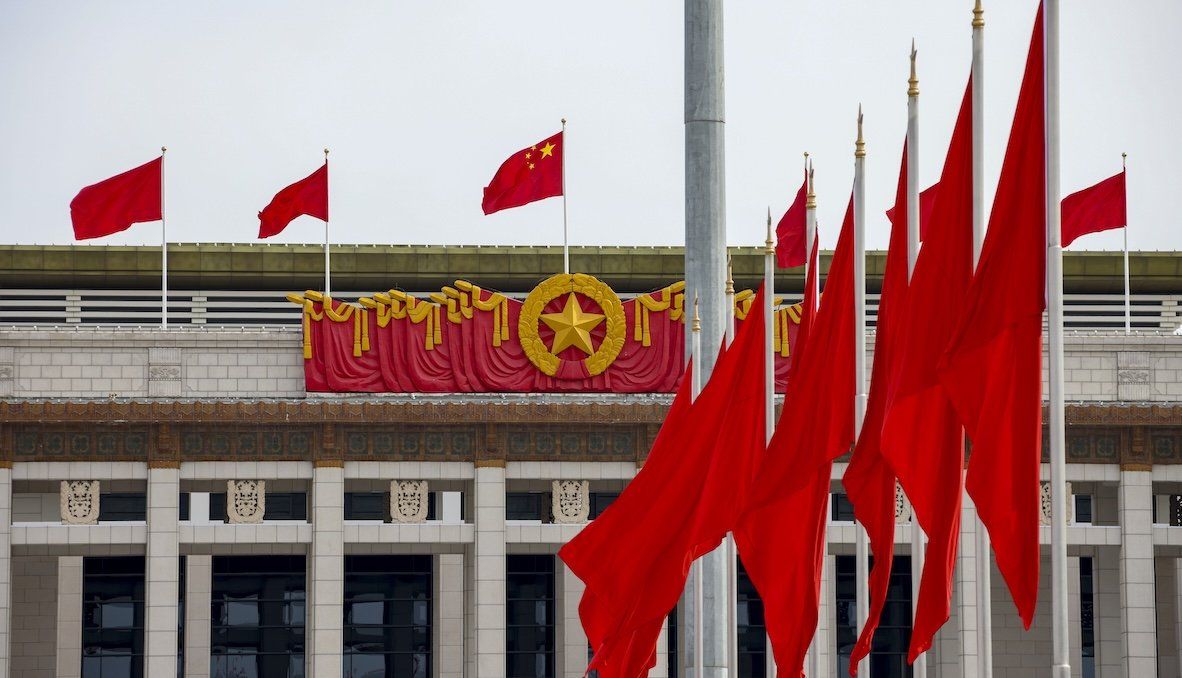Viewpoint: China’s annual NPC meeting to address lackluster economy and Trump threat
Chinese national flags flutter near Tian'anmen Square ahead of China's annual sessions of its top legislature and political advisory body, known as the "Two Sessions," on March 3, 2025, in Beijing.
A sluggish economy and new headwinds created by Donald Trump’s return to the White House will be prominent themes when the nearly 3,000 delegates of China’s National People’s Congress, or NPC, convene in Beijing starting Wednesday. The legislative session will run for about seven days (time not fixed) in parallel with that of the National Committee of the Chinese People’s Political Consultative Conference, or CPPCC. The so-called Two Sessions represent China’s biggest annual political gathering and provide insight into the leadership’s priorities for the year ahead.
We asked Eurasia Group expert Lauren Gloudeman what to watch out for.
What are the NPC and CPPCC?
The NPC is China’s highest governmental organ and national legislature. It usually convenes just once a year to advance legislation and approve national policy plans; the smaller Standing Committee of the National People’s Congress meets more often to continue the body’s legislative work. The CPPCC unites about 2,000 representatives of different social and political groups, giving them the opportunity to make their views known to the country’s leadership. Its role is more symbolic than anything else.
How does the NPC fit into China’s broader governance framework?
On the one hand, you have organs of government such as the NPC and the State Council, which implements legislation passed by the NPC and supervises the bureaucracy. On the other hand, you have the Chinese Communist Party, with its decision-making bodies such as Politburo and the Central Committee. The relationship between the government and the party has changed over time. Xi Jinping – general secretary of the party and president of the Chinese state – has made it a priority to assert the party’s authority over the government. Li Qiang, the party’s No. 2 official is premier of the State Council; Zhao Leji, the party’s No. 3 official, heads the NPC.
Are the Two Sessions’ proceedings open to the public?
The first couple of days will be open-door sessions of public speeches, reports, and press conferences. Li will present his so-called government work report. Like the US president’s state-of-the-union speech, the work report reviews the achievements of the past year and identifies key tasks ahead for the government. It usually sets economic targets. In addition, Xi will give remarks and the Ministry of Finance will give a budget report. Then there will be several days of closed-door sessions, during which not much information will emerge. At the end, different ministries will follow up with press conferences about their plans to advance policies discussed at the NPC.
What do you expect will be the main topics of discussion?
One major topic will be what to do about weak consumer spending, which has been a challenge for years now – especially since the COVID-19 lockdowns, when some people couldn’t leave their homes for months. Nonetheless, we’re not expecting a sea change in the policy approach to stimulating spending. More likely is an expansion of existing trade-in programs that offer subsidies for consumers to trade in their old EVs, household appliances, and other consumer goods for new ones.
What else would you highlight?
On a related note, officials will discuss measures to promote private enterprises. One of the reasons consumer spending is weak is that so many businesses struggled during the pandemic and continue to struggle, which has affected hiring. Authorities aggravated these problems in the private sector with an aggressive regulatory campaign against major companies they thought were insufficiently aligned with the party’s national development strategy. Now they are trying to repair the damage. Xi met last week with the leaders of 20 or 30 companies to reassure them that the government cares about stabilizing the private sector, and the NPC is expected to discuss a so-called private economy law. This measure could, for example, codify into law that private companies have equal rights and status with state-owned companies and offer guarantees of payment for private companies doing business with local governments.
How do you expect tensions with the Trump administration – which has slapped new tariffs on China and threatened more – to play into the NPC discussions?
The NPC is not an event that reacts to or is calibrated around recent events. That said, since Trump took office, we’ve been seeing the party’s high-level talking points acknowledging “external uncertainty” – which is code for Trump-related risks. Its response has been to make it clear to the country that it is committed to increasing support for the domestic economy to boost confidence. I expect these themes to be prominent at the Two Sessions.
Edited by Jonathan House, senior editor at Eurasia Group.
